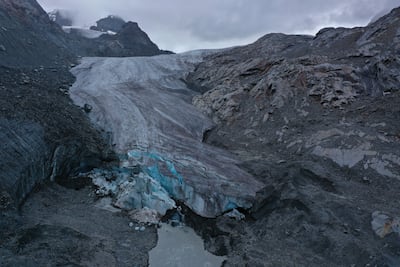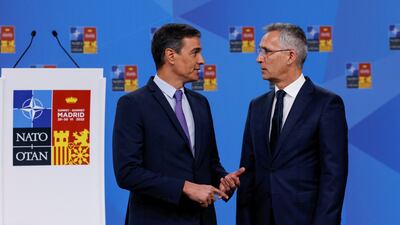Nato has responded to pressure to meet the challenge presented by climate change to world security by pledging to cut its civilian and military greenhouse gas emissions by at least 45 per cent by 2030.
Secretary General Jens Stoltenberg on Tuesday said alliance operations would be carbon neutral by 2050, as he announced the first emissions targets for the organisation.
"It will not be easy but it can be done," he said at the Nato summit in Madrid. "All allies are committed to reducing their greenhouse gas emissions as part of the Paris agreement. Adapting their militaries will contribute to this, including more green tech, such as renewables, climate-friendly synthetic fuels and more energy efficient solutions."
A report from a British think tank said it was “imperative” that the summit addressed Nato’s role in providing climate solutions, especially as rising temperatures across in the Middle East and North Africa would have ramifications for security in Europe.
“The Mena region risks being particularly impacted and is in Europe’s neighbourhood,” Chatham House said.
“Although recent Nato interventions in the region have been limited to operations in Libya, Afghanistan and Iraq, further instability due to climate change on Nato’s southern flank could be the tipping point to develop a much-needed coherent strategy for supporting stabilisation and peacebuilding efforts in the Sahel and beyond.”
Madrid summit discussions were due to open on Tuesday with an address on climate change and alliance security from Iceland’s Prime Minister Katrin Jakobsdottir.
The Chatham House paper urged Nato to prioritise climate change because it can become a “threat multiplier” with increased mass migration, weakening governments and food and water scarcity.

“It is imperative the summit and the new Strategic Concept [statement of the alliance's values] lay the groundwork for Nato’s sustained role in tackling climate change-induced security challenges,” it said.
Climate change threatens strategic interests by exacerbating problems, which can “ultimately contribute to conflict”.
As Nato prepares to issue its first Climate Change and Security Progress Report in Madrid, it was “crucial this maintains the same level of determination to prepare the alliance for climate-related instability”, Chatham House said.
Another report, by the International Military Council on Climate and Security, highlighted the “high operational costs” of fossil fuel use by militaries.
It recommended that Nato states procure and develop equipment with low carbon emissions.
“We have passed the point of debating whether or not climate change is also a matter of national security,” said Gen Tom Middendorp, chairman of IMCCS and former chief of defence for the Netherlands.
“It is time to develop solutions. The security sector has a role to play in forecasting the security effects of climate change and in the areas of mitigation and adaptation.”
Last year, Nato figures suggested the carbon emissions from a 60-tonne US Abrams main battle tank were the equivalent of 10 Mercedes-Benz cars.
Mr Stoltenberg has urged militaries to look at how they can power tanks and jets with alternative energy sources, such as solar panels, to reduce its carbon emissions.
“Nato should do its part to look into how we can reduce emissions from military operations,” he told a Chatham House event in 2021.
“We know that heavy battle tanks or fighter jets and naval ships consume a lot of fossil fuel and emit greenhouse gases and therefore we have to look into how we can reduce those emissions by alternative fuels, solar panels or other ways of running our missions.”
Reducing dependence on fossil fuels would help to eliminate a vulnerability common to many operations, where long supply lines are used take fuel to the front line, Mr Stoltenberg said.


